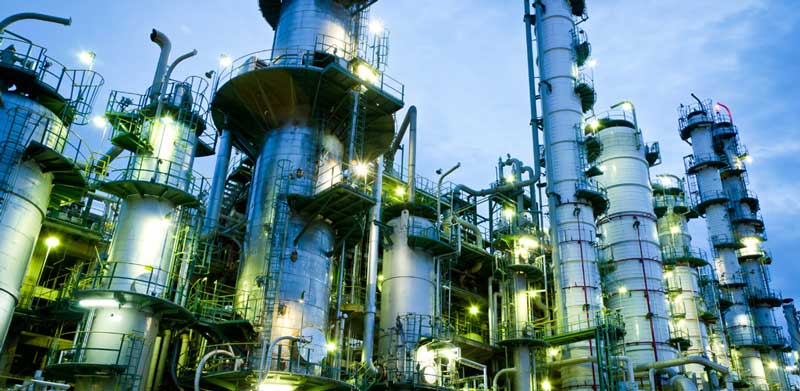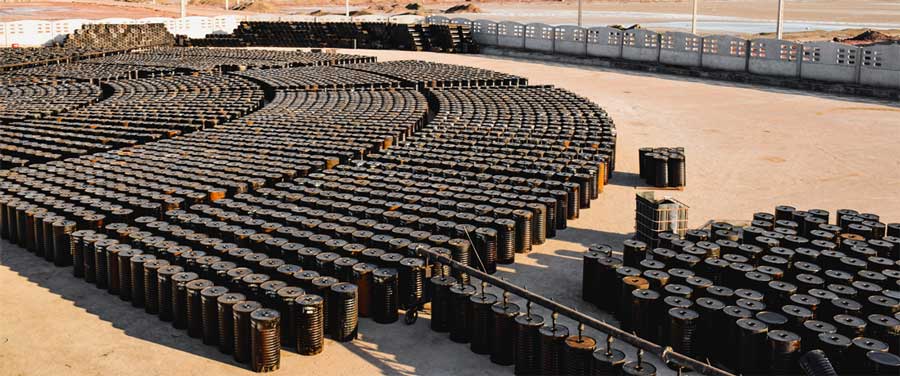What is Industrial Manufacturing Bitumen?
Industrial manufacturing bitumen is a specialized form of bitumen used in large-scale production environments. Known for its durability, high-temperature resistance, and adhesive properties, this material plays a key role in a wide range of heavy-duty applications across different industries. This high-quality bitumen is supplied by our trusted brand, iranpetroexport.
From construction to insulation, industrial manufacturing bitumen ensures performance, longevity, and efficiency in every step of the manufacturing process. It is commonly found in factories, industrial plants, and engineering projects where strong bonding and weather resistance are critical.
At iranpetroexport, we supply high-quality industrial manufacturing bitumen tailored to your production needs. Our solutions are trusted globally for their consistency, performance, and cost-effectiveness—making us your reliable partner in industrial growth.

What is Industrial Manufacturing Bitumen Used For?
Industrial manufacturing bitumen is widely used across various sectors due to its exceptional adhesive properties and resistance to harsh environmental conditions. Its versatility allows it to serve in multiple applications, especially where durability and waterproofing are essential. The material’s ability to withstand heavy loads and extreme temperatures makes it indispensable in industrial settings. Additionally, its compatibility with related products like paving bitumen and bitumen waterproofing enhances its functional range.
Below are some of the most common uses of industrial manufacturing bitumen:
- Paving and Road Construction
- Waterproofing Applications
- Insulation in Industrial Equipment
- Protective Coatings
- Adhesive in Manufacturing Processes
Paving and Road Construction:
Industrial manufacturing bitumen is a key component in paving, providing a durable and flexible surface that resists cracking and wear. It ensures roads and industrial flooring last longer under heavy traffic and harsh weather. This makes it compatible with other materials like diesel and mazut used in construction machinery.
Waterproofing Applications:
Due to its waterproof nature, bitumen is extensively used to protect buildings and industrial structures from moisture damage. It forms a reliable barrier preventing water infiltration. Its synergy with bitumen waterproofing techniques further improves the durability of protective layers.
Insulation in Industrial Equipment:
Bitumen serves as an effective insulating material, maintaining temperature stability and protecting machinery parts from heat and corrosion in industrial environments. This helps in optimizing the use of fuels like fuel oil and managing emissions efficiently.

Protective Coatings:
Applied as a protective layer, bitumen safeguards metal surfaces and infrastructure against rust, chemical damage, and physical wear. These coatings often work alongside chemical products such as granular urea to enhance industrial performance.
Adhesive in Manufacturing Processes:
Its excellent adhesive qualities make bitumen useful in binding materials together in different manufacturing applications, enhancing product strength and durability. This contributes to efficient production lines especially in sectors using prilled urea formulations.
Different Grades and Types of Manufacturing Bitumen
Manufacturing bitumen comes in various grades and types, each designed for specific industrial applications. These grades differ based on their viscosity, penetration level, and temperature susceptibility. Understanding these variations is essential to select the right bitumen for construction, waterproofing, or insulation purposes. Our brand, iranpetroexport, provides a wide range of high-quality bitumen products tailored to meet diverse industrial needs.
1. Cutback Bitumen
Cutback bitumen is produced by dissolving bitumen in petroleum solvents to reduce viscosity. This makes it easier to apply at lower temperatures, especially in cold climates. It is widely used in road construction and maintenance due to its excellent adhesive properties. The solvents evaporate after application, leaving behind a durable bitumen layer.
2. Emulsified Bitumen
Emulsified bitumen consists of bitumen droplets suspended in water with the help of emulsifiers. It allows for safer handling and application without heating. This type is commonly used in surface treatments, cold mixes, and slurry seals. Its ability to bond well with aggregates improves road surface quality.

3. Oxidized Bitumen
Oxidized bitumen is manufactured by blowing air through hot bitumen, increasing its hardness and softening point. This grade is suitable for waterproofing membranes and roofing applications. It offers excellent resistance to heat and aging, making it durable under harsh environmental conditions.
4. Straight-run Bitumen
Straight-run bitumen is a residue from crude oil distillation without further modification. It has moderate hardness and is mainly used in paving and industrial flooring. Its balance of flexibility and strength makes it suitable for areas with moderate traffic and temperature variations.
5. Polymer Modified Bitumen (PMB)
Polymer modified bitumen is enhanced with polymers to improve elasticity and performance. It provides superior resistance to deformation, cracking, and weathering. PMB is ideal for high-traffic roads and heavy-duty industrial applications requiring long-lasting durability.
Common Applications in the Manufacturing Sector
Industrial manufacturing bitumen is widely used across various manufacturing sectors due to its excellent durability and versatility. It serves as a crucial material in road construction, waterproofing, and insulation processes. The adaptability of bitumen allows industries to benefit from its unique properties, such as resistance to water and chemicals, making it indispensable in many manufacturing applications.
In manufacturing, bitumen is often employed for waterproofing to protect buildings and infrastructure from moisture damage. It also acts as a binder in paving materials, ensuring roads and surfaces remain strong and flexible under heavy traffic. Moreover, bitumen is used for corrosion protection and thermal insulation in industrial equipment, enhancing their lifespan and performance.

Environmental Impact of Industrial Bitumen Usage
In recent years, concerns about environmental pollution have increased, especially in relation to industrial materials. One of the materials often discussed is industrial manufacturing bitumen.
The use of industrial manufacturing bitumen is common in construction and road paving. However, it can negatively affect the environment due to the release of harmful substances during its production and use.
Key environmental impacts:
- Air pollution from VOCs and toxic fumes
- Water contamination through surface runoff
- Soil pollution from chemical leaching
- High carbon emissions during production
- Health risks for workers exposed to fumes
While industrial manufacturing bitumen is essential in many industries, efforts should be made to minimize its environmental damage by adopting safer materials and cleaner production methods.
Looking ahead, investing in green technologies and alternative materials can help reduce the harmful impact of industrial bitumen on the planet. Awareness and action are key to a more sustainable future.
Storage and Handling of Bitumen in Industrial Settings
Proper storage and handling of industrial manufacturing bitumen is critical to maintain safety and product quality. Bitumen must be stored in insulated tanks with temperature control to prevent hardening or the release of toxic fumes. In industrial settings, automated systems reduce human exposure and improve efficiency. Workers must use protective gear to avoid burns and inhalation risks. Facilities should include spill containment systems and follow strict safety protocols. Managing industrial manufacturing bitumen correctly also reduces environmental impact and equipment damage.
Why Choose iranpetroexport for Your Bitumen Supply
At iranpetroexport, we combine quality, reliability, and global expertise to meet your industrial material needs. As a trusted name in the export of industrial manufacturing bitumen, we ensure consistent supply, competitive pricing, and strict adherence to international standards.

Our product range includes high-grade bitumen waterproofing solutions for construction and infrastructure projects, as well as premium urea fertilizer for agriculture. Focused on customer satisfaction and timely delivery, iranpetroexport is a trusted provider of Waterproofing Bitumen Supply in Iran.
Choose us for quality you can trust — from bitumen to urea, we deliver excellence.
Conclusion
In conclusion, the use of industrial manufacturing bitumen remains a critical component in modern infrastructure, from road construction to waterproofing solutions. While its industrial benefits are undeniable, proper handling, storage, and environmental awareness are essential to minimize associated risks.
Leading suppliers like iranpetroexport not only ensure high-quality bitumen products but also provide a broader range of industrial materials, such as bitumen waterproofing systems and urea fertilizer, meeting global demands with consistency and compliance.
Choosing the right partner for your bitumen supply is crucial — and with iranpetroexport, you gain reliability, expertise, and a commitment to sustainable practices. For those seeking long-term value and dependable service in the field of industrial manufacturing bitumen, iranpetroexport is the smart choice.
Industrial Manufacturing Bitumen: Frequently Asked Questions (FAQs)
